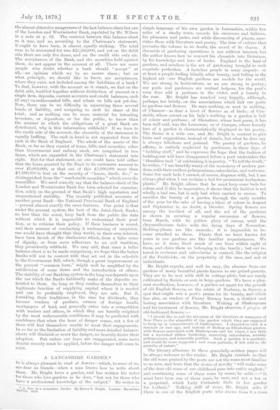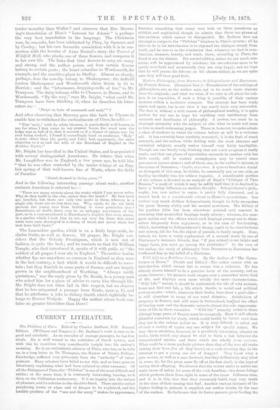A LANCASHIRE GARDEN.*
IT is always pleasant to read of flowers—which, to some of us, are dear as friends—when a man knows how to write about them. Mr. Bright loves a garden, and has written his notes for those who love gardens as he does, "but not for those who have a professional knowledge of the subject." He writes in
• A rear in a Lancashire Garden. By Henry A. Bright. London: Macmillan And Co. 1879.
simple language of his own garden in Lancashire, within five miles of a sinoky town, records his successes and failures, his pleasures and pains, and while discoursing of plants, asso- ciates them with literature and poetry. The tone of culture that pervades the volume is, no doubt, the secret of its charm. A chronicle of gardening operations is not without interest, but the author knows how to convert his chronicle into literature, by his knowledge and love of books. England is the land of gardens, and nowhere is the art of gardening brought to such exquisite perfection. A tasteless people in some respects—or at least a people feeling blindly after beauty, and failing in the highest art--our English gardens are models for the world. We are strong in horticulture, as we are strong in poetry ; our poets and gardeners are mutual helpers, for the poet's song does add a perfume to the violet, and a beauty to the rose. Mr. Bright has touched very happily, although, perhaps, too briefly, on the associations which link our poets to gardens and flowers. He says nothing, or next to nothing, of Chaucer—as dear a lover of flowers as of birds ; of Con- stable, whose sonnet on his lady's walking in a garden is full of colour and perfume ; of Shenstone, whose best poem, it has been well said, was the Leasowes; or of Cowper, whose homely love of a garden is characteristically displayed in his poetry. The theme is a wide one, and Mr. Bright is content to give hints and suggestions, instead of details, but what he does say is always felicitous and pointed. The poetry of gardens, he affirms, is entirely neglected by gardeners, in these days of "bedding stuff," and he expresses the hope that the fashion of bedding-out will have disappeared before a poet undertakes the "thankless task "of celebrating it in poetry. "To toll the truth," he writes," I am heartily weary of the monotony of modern gar- dens, with their endless pelargoniums, calceolarias, and verbenas. Some few such beds I cannot, of course, dispense with, but I am always glad when I can reclaim a bed for permanent herbacions plants." Mr. Bright allows that he must keep some beds for colour, and if this be imperative, it shows that the fashion is not wholly a bad one, but is only bad when carried to excess. To sacrifice the beauty of a garden through the early months of the year for the sake of having a blaze of colour in August and September is, no doubt, a blunder. Spring flowers are among the loveliest of all, and the art of the gardener is shown in securing a regular succession of flowers, from March, with its golden glory of crocus, until the chrysanthemum fades with the dying days of November.
Bedding-plants are like annuals ; it is impossible to be- come attached to them. Plants that we have known for years in our gardens are like familiar acquaintances. We have, as it were, lived much of our lives within sight of them, and claim them as belonging to the family ; but our in- terest in verbenas and ealceolarias is centred, like the religion of the Positivists, on the perpetuity of the race, and not of
Mr. Bright regrets, and well he may, the absence from our gardens of many beautiful plants known to our grand-parents. They are to be met with still in cottage plots, but are rarely cultivated by florists or seen in large gardens. We have a plea- sant recollection, however, of a garden set apart for the growth of old English flowers, on the estate of Norbury, in Surrey, a spot that might win a poet's praise for its beauty, and which has also, as readers of Fanny Barney know, a distinct and. lasting association with literature. Writing of Shakespeare and his treatment of flowers, Mr. Bright observes, a prop,s of
old-fashioned flowers :—
"I should like to call the attention of the directors or managers of Now Place to the absurdity of the garden which they are supposed to keep up in remembrance of Shakespeare. I chanced to visit it a summer or two ago, and instead of finding an Elizabethan garden, with flowers nssociated with Shakespeare and his times, I saw little but a wretched ribbon bordering, etarveling citicoolaries, scrubby pelargoniums, end miserable porilles. Such a garden is a mockery, and would be more suggestive and more pathetic, if left wild to the growths of nature."
The literary allusions in these gracefully-written pages will be always welcome to the reader. Mr. Bright reminds us that the old roses praised by the poets are not the roses most familiar to us now, and. fears that the desire of novelty "will make some of the dear old roses of our childhood pass into entire neglect ;" and mentioning some of these roses by name, he adds It must have been one of these roses, be sure, and not a tea or a perpetual, which Lady Corisande finds in her garden for Lothair." Talking still of roses, Mr. Bright asks if there is one of the English poets who draws from it a more tender morality than Waller P and observes that Mrs. Brown- ing's translation of Bion's "Lament for Adonis" is perhaps the very best translation in the language. The Christmas rose, he remarks, has been celebrated by Pliny, by Spenser, and by Cowley ; but his own favourite association with it is in con- nection with the heroine of Anne Bronte's story, the Tenant of Wildfell flan, who plucks one of these flowers, and compares it to her own life. The links that bind flowers to song are many and strong, and the author points out how certain flowers belong to certain poets ; the lesser celandine to Wordsworth, for example, and the sensitive-plant to Shelley. Almost as closely, perhaps, does the cowslip belong to Shakespeare ; the daffodil (unless Shakespeare and Wordsworth claim thirds in it) to Herrick ; and. the "laburnums, dropping-wells of fire," to Mr. Tennyson. The daisy belongs alike to Chaucer, to Burns, and to Wordsworth. "By the way," says Mr. Bright, "what could Mr. Tennyson have been thinking of, when he describes his lotus- eaters as,—
'Propt on beds of amaranth and moly' " ?
And after observing that Mercury gave this herb to Ulysses to enable him to withstand the enchantments of Circe, he adds :—
"This reoly,' with its white blossom, is particularly well known to me, for when I first came to my present house, the wood near the lodge was BO full of it, that it seemed as if a dinner of onions was for over being cooked; I found it exceedingly hard to eradicate. 'IVfoly is none other than the garlic, and Circe had, apparently, the same objection to it as had the wife of the Merchant of Bagdad in the Arabian Nights."
Mr. Bright has travelled in the United States, and is acquainted with several distinguished Americans. He relates that when Mr. Longfellow was in England, a few years ago, he told him "that he was often reminded by the tender foliage of an Eng- lish spring of that well-known line of Watts, where the fields
of Paradise
'Stand dressed in living green.'"
And in the following interesting passage about rooks, another eminent American is referred to :—
"There are many secrets about the rooks whick I can never solve. Why do they build in the elm, rather than the beech P My best trees are beeches, but there are only two nests in them, whereas in a single elm there are no less than ten. Why, again, do the old birds prevent the young ones from building in some particular tree ? Sometimes, no doubt, there may be an unhappy association of the past, as in a case mentioned in Hawthorne's English Note-book, whore, in a garden which I took him to see, not very far from this, some nests were once destroyed in a clump of trees, and never since has nest been built there."
The Lancashire garden, which is on a fairly large scale, in- cludes fruits, as well as flowers. Of grapes, Mr. Bright con- siders that the Grizzly Frontignan, which is now out of fashion, is quite the best ; and lie reminds us that Sir William Temple, who first introduced it, speaks of it with pride, as "the noblest of all grapes I ever ate in England." The author doubts whether figs are anywhere so common in England as they wore in the last century, a fact which it would be difficult to ascer- tain; but they flourish in some parts of Sussex, and are largely grown in the neighbourhood of Worthing. "Always verify quotations," was the reply given by Dr. Routh, to a young man who asked him for a piece of advice to carry him through life. Mr. Bright does not often fail in this respect, but we observe that he has misquoted a passage from Keats, upon p. 15, and that he attributes a joke to Sidney Smith which rightfully be- longs to Horace Walpole. Happy the author whose book con- tains no greater blemishes than these



































 Previous page
Previous page